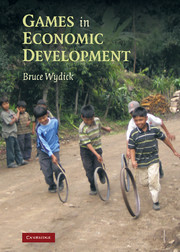Book contents
- Frontmatter
- Contents
- List of Figures and Tables
- Preface
- 1 Economic Development, Interdependence, and Incentives
- 2 Games
- 3 Development Traps and Coordination Games
- 4 Rural Poverty, Development, and the Environment
- 5 Risk, Solidarity Networks, and Reciprocity
- 6 Understanding Agrarian Institutions
- 7 Savings, Credit, and Microfinance
- 8 Social Learning and Technology Adoption
- 9 Property Rights, Governance, and Corruption
- 10 Conflict, Violence, and Development
- 11 Social Capital
- 12 The Political Economy of Trade and Development
- Appendix
- Exercises for Interested Readers
- References
- Index
9 - Property Rights, Governance, and Corruption
Published online by Cambridge University Press: 05 September 2012
- Frontmatter
- Contents
- List of Figures and Tables
- Preface
- 1 Economic Development, Interdependence, and Incentives
- 2 Games
- 3 Development Traps and Coordination Games
- 4 Rural Poverty, Development, and the Environment
- 5 Risk, Solidarity Networks, and Reciprocity
- 6 Understanding Agrarian Institutions
- 7 Savings, Credit, and Microfinance
- 8 Social Learning and Technology Adoption
- 9 Property Rights, Governance, and Corruption
- 10 Conflict, Violence, and Development
- 11 Social Capital
- 12 The Political Economy of Trade and Development
- Appendix
- Exercises for Interested Readers
- References
- Index
Summary
The Lord hates dishonest scales, but accurate weights are His delight.
– Proverbs 11:1ONE OF THE fundamental human dilemmas is that individuals potentially stand to gain from competition as well as cooperation with one another. Costly mistakes have been made from failing to recognize the two horns of this dilemma and that the tension between these conflicting incentives underlies nearly all social behavior. For example, this failure has led some to overemphasize the competitive nature of market-oriented societies, where social benefits are misperceived to accrue chiefly from the competitive aspects of markets. Economists have more recently come to understand that the cooperative aspects of market-oriented societies are just as important as their competitive aspects. The institutional constraints that check self-interested behavior are instrumental to the freedoms that allow for the pursuit of self-interested gain.
Institutions dictate the rules of the game in any society. They serve as guidelines for human interaction, and they set the limits for human freedoms. In his Institutions, Institutional Change, and Economic Performance (1990), Nobel laureate Douglas North defines institutions as “the framework within which human interaction takes place.” He draws an analogy between the rules that govern competitive economic activity, and rules that govern competitive sports. In each, the rules of the game create a stable, predictable structure to behavior. Even in a sport as seemingly violent as American football, an elaborate (some would argue too elaborate) set of rules carefully governs play.
- Type
- Chapter
- Information
- Games in Economic Development , pp. 147 - 169Publisher: Cambridge University PressPrint publication year: 2007



